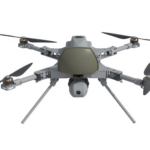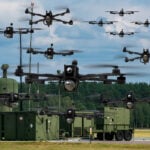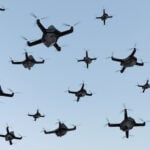Defence AI in China – Study

The Defense AI Observatory (DAIO) at the Helmut Schmidt University in Hamburg has released a new study examining the utilization of defence artificial intelligence (AI) in China. The complete study titled “Overtaking on the Curve? Defense AI in China” can be accessed through this link [PDF]: https://defenseai.eu/wp-content/uploads/2023/04/daio_study2313_overtaking_on_the_curve_john_lee.pdf. The study provides valuable insights into various aspects of the Chinese military’s AI applications. It explores the current use of AI in areas such as intelligent warfare, cyberspace operations, unmanned systems, and military expenditure. Furthermore, the study offers predictions on the future integration of AI in command and control systems, autonomous weapons, information warfare, and human-machine teaming. It serves as a comprehensive resource for understanding the Chinese military’s AI capabilities and their potential developments in the coming years.
Summary of the study
China’s rapid advancements in artificial intelligence (AI) have brought about significant implications for its military capabilities. Through a comprehensive analysis of various sources, including reports, academic papers, and news articles, it becomes evident that the Chinese military has been actively exploring and utilizing AI technologies across multiple domains. The study delves into the current applications of AI by the Chinese military and offers predictions on how these technologies might shape China’s military strategy in the future.
Current Applications of AI in the Chinese Military
- Intelligent Warfare: The Chinese People’s Liberation Army (PLA) has prioritized the integration of AI in its military operations. AI technologies are being utilized to enhance decision-making, optimize command and control systems, and improve battlefield awareness. This includes applications such as intelligent surveillance, autonomous vehicles, and predictive analytics.
- Cyberspace Operations: China has recognized the importance of AI in cyberspace operations. It leverages AI for tasks like network defence, threat identification, and information warfare. AI-powered algorithms help detect and respond to cyber threats, enabling the Chinese military to better protect its networks and infrastructure.
- Unmanned Systems: The Chinese military has been investing in AI-enabled unmanned systems, including aerial drones, underwater vehicles, and autonomous robots. These systems are used for various purposes such as reconnaissance, surveillance, logistics, and even combat operations.
- Military Expenditure: China’s commitment to AI development is evident in its military expenditure. The country has been increasing its investment in AI research and development, aiming to become a global leader in AI technologies. This funding enables the Chinese military to acquire and develop cutting-edge AI capabilities.
Predictions on Future AI Use by the Chinese Military
-
- Intelligent Command and Control: AI will play a crucial role in enhancing the Chinese military’s command and control capabilities. Advanced AI algorithms will enable real-time data analysis, facilitating quicker decision-making and more efficient resource allocation during military operations.
- Autonomous Weapons Systems: China is likely to invest in the development of autonomous weapons systems that incorporate AI technologies. These systems could include swarms of unmanned aerial vehicles, intelligent missiles, and autonomous combat robots. The integration of AI will enhance the speed, precision, and effectiveness of these weapons.
- Information Warfare and Influence Operations: AI will continue to be a key enabler for China’s information warfare and influence operations. Through AI-powered algorithms, the Chinese military can analyze massive amounts of data, identify trends, and manipulate information to shape public opinion and gain strategic advantages in the information domain.
- Human-Machine Teaming: The Chinese military is expected to explore the concept of human-machine teaming, where AI technologies work alongside human operators. This collaboration could enhance the capabilities of individual soldiers, improve situational awareness, and enable more efficient coordination on the battlefield.
In addition, the study also mentions Chinese interest in “…in AI’s possibilities for exploiting the “cognitive domain” of warfare, manipulating human cognition to influence the adversary’s perceptions, situational awareness and will to fight…” which is something I’ve been writing about and predicting for over a decade.
Conclusion
China’s military has embraced the potential of AI and has made significant strides in integrating these technologies into its operations. The current applications of AI in areas such as intelligent warfare, cyberspace operations, unmanned systems, and military expenditure illustrate China’s commitment to becoming a dominant force in AI-enabled military capabilities. As we look to the future, it is clear that AI will continue to play a pivotal role in shaping China’s military strategy, with advancements in intelligent command and control, autonomous weapons systems, information warfare, and human-machine teaming likely to define the Chinese military’s future AI landscape.
For 30+ years, I've been committed to protecting people, businesses, and the environment from the physical harm caused by cyber-kinetic threats, blending cybersecurity strategies and resilience and safety measures. Lately, my worries have grown due to the rapid, complex advancements in Artificial Intelligence (AI). Having observed AI's progression for two decades and penned a book on its future, I see it as a unique and escalating threat, especially when applied to military systems, disinformation, or integrated into critical infrastructure like 5G networks or smart grids. More about me, and about Defence.AI.











































